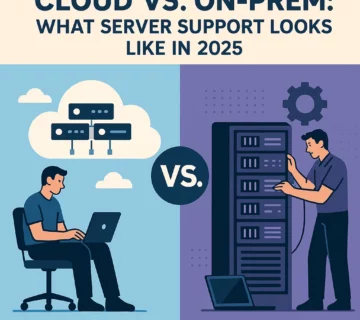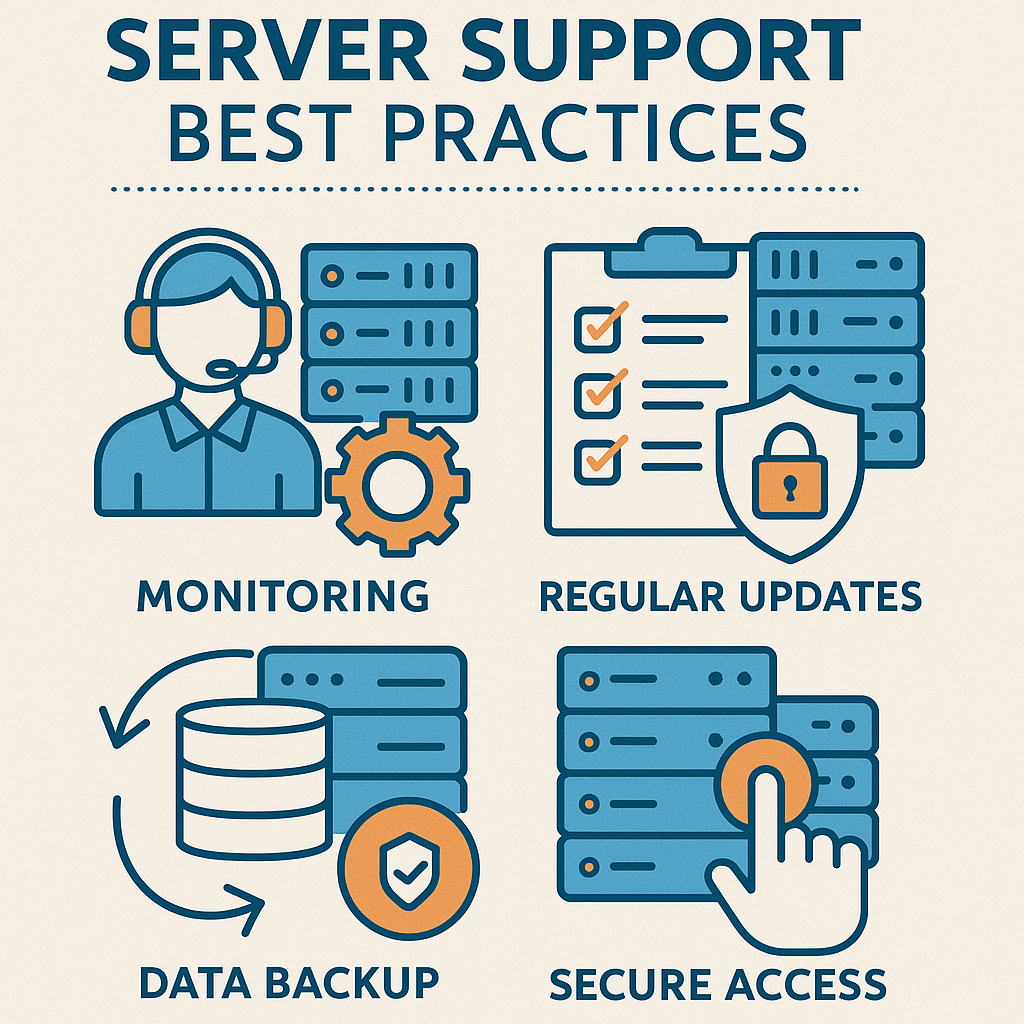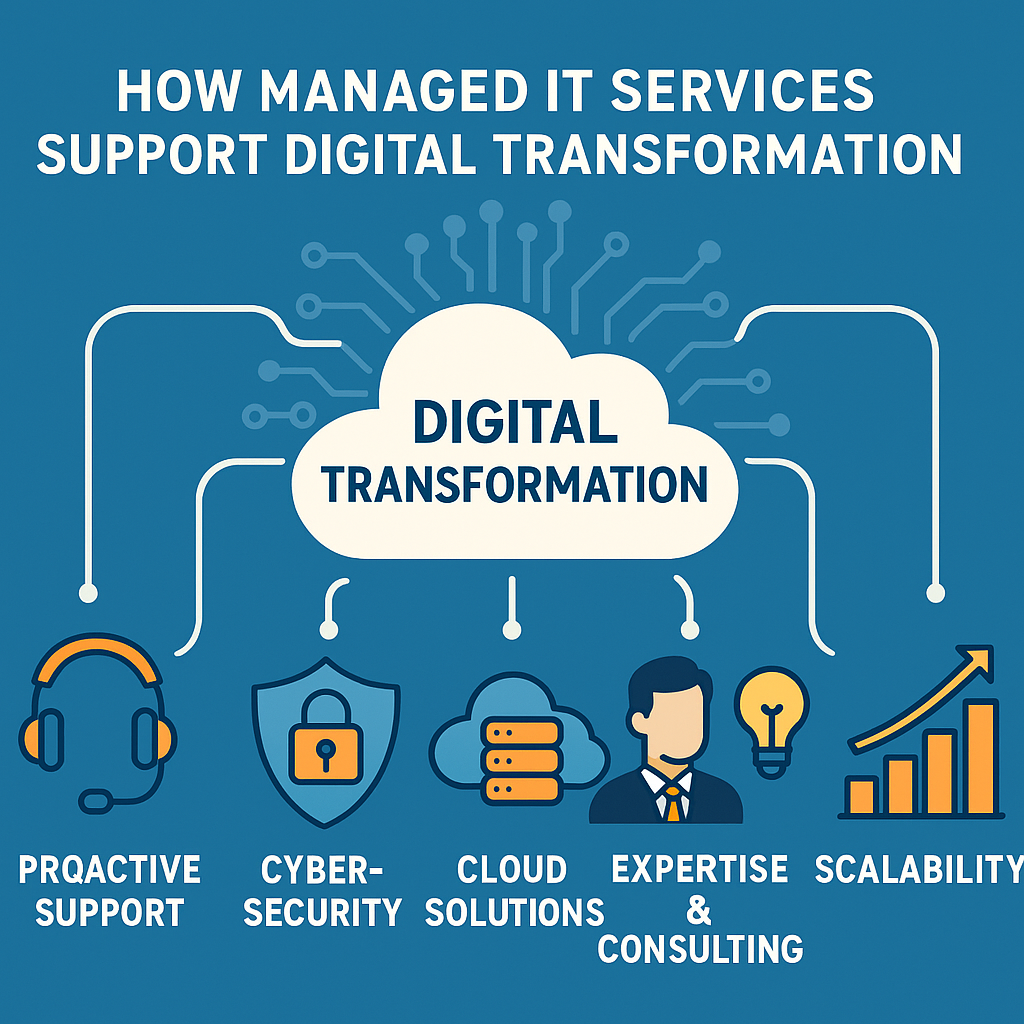Why Managed IT Support is a Game Changer for Small Businesses

Small businesses face mounting pressure to compete with larger enterprises while managing limited resources and budgets. Technology infrastructure plays a crucial role in this competitive landscape, yet many small business owners struggle to maintain reliable IT systems without breaking the bank. Managed IT services have emerged as a transformative solution that levels the playing field, especially for businesses seeking reliable IT support and managed services.
What Are Managed IT Services?
Managed IT services refer to the practice of outsourcing IT operations and responsibilities to specialized providers. These Managed Service Providers (MSPs) handle everything from network monitoring and small business server support to cybersecurity and technical assistance. Rather than hiring full-time IT staff or dealing with technology issues reactively, businesses partner with professional server support teams for proactive, comprehensive IT management.
For businesses searching for “managed IT services near me,” this approach offers immediate access to enterprise-level expertise without the overhead costs of maintaining an internal IT department.
The Financial Benefits of Outsourced IT Services
Cost-Effective Alternative to In-House IT
Traditional IT management requires significant upfront investments in hardware, software, and personnel. Small businesses often face difficult choices between adequate IT infrastructure and other critical business needs. Outsourced IT services transform this dynamic by converting large capital expenditures into predictable monthly operational costs.
MSPs typically operate on subscription-based models, allowing businesses to budget effectively while accessing enterprise-level technology and expertise. This approach eliminates expensive emergency IT repairs and reduces costly downtime risks. Studies indicate that businesses using managed IT services experience 40-60% lower IT costs compared to traditional in-house management.
Transparent Pricing Models
Many providers offer flexible pricing structures, including hourly server support services for businesses with specific needs. This flexibility allows companies to scale their IT investment based on actual requirements rather than maintaining expensive full-time resources.
Enhanced Security Through Professional Cyber Security Services
Comprehensive Protection Strategies
Cybersecurity threats pose existential risks to small businesses, with 60% of small companies closing within six months of a cyber attack. Professional cyber security services specialize in implementing robust security measures that would be prohibitively expensive for small businesses to develop independently.
Advanced Threat Detection and Response
These security services include continuous network monitoring, advanced threat detection, regular security updates, and employee training programs. Cyber security services providers also help businesses navigate complex compliance requirements such as GDPR, HIPAA, or PCI DSS, ensuring adherence to industry standards without requiring specialized internal expertise.
Microsoft 365 Support for Small Business Success
Streamlined Productivity Solutions
Modern businesses rely heavily on cloud-based productivity suites, making Microsoft 365 support for small business operations essential. Professional MSPs provide comprehensive support for Microsoft 365 implementation, migration, and ongoing management, ensuring businesses maximize their investment in these critical tools.
Integration and Optimization
Expert Microsoft 365 support includes user training, security configuration, data migration, and integration with existing business processes. This specialized support ensures that small businesses can leverage advanced features like Teams collaboration, SharePoint document management, and advanced security controls effectively.
Proactive IT Management and Small Business Server Support
Preventing Problems Before They Occur
Traditional IT support operates reactively, addressing problems after they occur. Professional server support takes a proactive approach, identifying and resolving potential issues before they impact business operations. This shift from reactive to proactive management significantly reduces downtime and improves overall system reliability.
24/7 Monitoring and Maintenance
MSPs use sophisticated monitoring tools that track system performance around the clock, automatically detecting anomalies and implementing fixes. This constant vigilance ensures that minor issues don’t escalate into major business disruptions, maintaining productivity and customer satisfaction.
Measuring Success with Desktop Support Metrics
Performance Tracking and Optimization
Successful IT management requires measurable outcomes. Desktop support metrics help businesses understand the value they receive from their IT investments. Key performance indicators include response times, resolution rates, system uptime, and user satisfaction scores.
Continuous Improvement Through Data
Professional MSPs provide regular reporting on desktop support metrics, enabling businesses to track improvements in productivity, reduced downtime, and enhanced user experience. These metrics demonstrate the tangible benefits of professional IT management and guide future technology investments.
Access to Enterprise-Level Technology Solutions
Leveling the Playing Field
Small businesses often struggle to afford cutting-edge technology solutions that larger competitors use routinely. Managed IT services bridge this gap by offering access to enterprise-grade software, hardware, and services at a fraction of the individual cost.
Advanced Infrastructure Without Capital Investment
Cloud computing platforms, advanced analytics tools, artificial intelligence applications, and sophisticated networking equipment become accessible through MSP partnerships. This democratization of technology allows small businesses to compete more effectively in their respective markets.
Scalability and Flexibility in IT Infrastructure
Growing with Your Business
Business growth often outpaces IT infrastructure capabilities, creating bottlenecks that hinder expansion. Managed IT services provide the flexibility to scale technology resources up or down based on current business needs without significant capital investments or lengthy procurement processes.
Rapid Deployment and Adaptation
Whether adding new employees, expanding to new locations, or launching new products, MSPs can quickly adapt IT infrastructure to support changing requirements. This agility enables small businesses to pursue growth opportunities without being constrained by technology limitations.
Focus on Core Business Activities
Eliminating IT Distractions
Small business owners and employees often spend valuable time troubleshooting technology issues instead of focusing on revenue-generating activities. Professional IT support and managed services eliminate these distractions by handling all technology-related concerns, allowing teams to concentrate on their core competencies.
Improved Productivity and Innovation
This shift in focus typically results in improved productivity, better customer service, and increased innovation. Business owners can dedicate their energy to strategic planning, business development, and operational improvements rather than IT management.
Professional Expertise and Continuous Learning
Access to Specialized Knowledge
Maintaining current knowledge of rapidly evolving technology requires continuous education and specialization. Small businesses rarely have resources to develop comprehensive IT expertise internally. Managed IT service providers employ certified professionals who specialize in various technology domains and stay current with industry developments.
Strategic Technology Planning
This expertise extends beyond technical skills to include strategic technology planning, vendor management, and best practices implementation. Small businesses gain access to collective knowledge and experience that would be impossible to replicate internally.
Business Continuity and Disaster Recovery
Protecting Against Unexpected Disruptions
Unexpected IT failures can devastate small businesses that lack comprehensive backup and recovery plans. Professional managed IT services implement robust business continuity strategies that ensure rapid recovery from various types of disruptions.
Comprehensive Recovery Solutions
These strategies include automated data backups, redundant systems, disaster recovery planning, and emergency response procedures. MSPs regularly test these systems to ensure they function effectively when needed, providing peace of mind and protecting business operations.
Competitive Advantage Through Innovation
Staying Ahead of Technology Trends
Technology innovation drives competitive advantage in most industries today. Small businesses partnering with managed IT service providers gain access to emerging technologies and implementation expertise that enables them to innovate faster than competitors managing IT internally.
Research and Development Benefits
MSPs invest heavily in research and development, testing new technologies and developing best practices for implementation. This investment benefits all their clients, allowing small businesses to leverage cutting-edge solutions without bearing the full cost of innovation.
Measuring Return on Investment
Quantifiable Business Improvements
The benefits of managed IT services translate into measurable business improvements. Companies typically experience increased productivity, reduced operational costs, improved customer satisfaction, and enhanced security posture. These improvements compound over time, creating sustainable competitive advantages that drive long-term success.
Performance Metrics and Reporting
Regular performance metrics and reporting help businesses track the return on investment from managed IT services, ensuring that the partnership continues to deliver value as business needs evolve.
Making the Transition to Managed Services
Planning for Success
Transitioning to managed IT services requires careful planning and execution. Successful implementations begin with thorough assessment of current IT infrastructure, identification of business requirements, and selection of an appropriate MSP partner.
Smooth Implementation Process
The transition process typically involves gradual migration of services to minimize disruption while ensuring continuity of operations. Clear communication, realistic timelines, and comprehensive testing ensure smooth implementation and immediate benefits realization.
Frequently Asked Questions
Q:1 How do I find reliable managed IT services near me? A: Start by researching local providers with strong reputations and industry certifications. Look for companies that offer comprehensive services including small business server support, cyber security services, and Microsoft 365 support for small business needs. Request references from current clients and evaluate their response times and service level agreements.
Q:2 What’s the difference between hourly server support services and managed services? A: Hourly server support services are reactive, billing only when problems occur, while managed services provide proactive monitoring and maintenance for a fixed monthly fee. Managed services typically offer better value through prevention-focused approaches, predictable costs, and comprehensive support including desktop support metrics tracking.
Q:3 How much do managed IT services typically cost for small businesses? A: Managed IT services costs vary based on business size, complexity, and service requirements. Most small businesses pay between $100-300 per user per month for comprehensive managed services, which includes small business server support, cyber security services, and ongoing maintenance. This is significantly less expensive than hiring full-time IT staff.
Q:4 Can managed IT services help with Microsoft 365 support for small business? A: Yes, professional MSPs specialize in Microsoft 365 support for small business operations, including implementation, migration, user training, and ongoing management. They ensure businesses maximize their Microsoft 365 investment through proper configuration, security settings, and integration with existing workflows.
Q:5 What desktop support metrics should I track with managed services? A: Key desktop support metrics include average response time, first-call resolution rate, system uptime percentage, user satisfaction scores, and ticket volume trends. Professional MSPs provide regular reporting on these desktop support metrics to demonstrate service quality and identify areas for improvement.
Q:6 How do cyber security services protect my small business? A: Professional cyber security services provide comprehensive protection through continuous monitoring, threat detection, security updates, employee training, and incident response. They implement enterprise-grade security measures including firewalls, antivirus protection, email security, and backup solutions to protect against cyber threats.
Q:7 What should I look for in small business server support? A: Quality small business server support should include 24/7 monitoring, proactive maintenance, regular backups, security updates, and rapid response to issues. Look for providers offering both proactive management and emergency support, with clear service level agreements and response time guarantees.
Q:8 Are outsourced IT services suitable for very small businesses? A: Yes, outsourced IT services are particularly beneficial for small businesses that cannot justify full-time IT staff. Even businesses with 5-10 employees can benefit from professional server support, cyber security services, and managed IT solutions that provide enterprise-level capabilities at affordable monthly costs.
Q:9 How quickly can managed IT services be implemented? A: Implementation timelines vary depending on business complexity and current IT infrastructure. Simple implementations can be completed within 2-4 weeks, while more complex environments may require 6-12 weeks. Most MSPs provide immediate support services while completing full implementation gradually.
Q:10 What happens if I need to switch managed IT service providers? A: Reputable managed IT service providers maintain comprehensive documentation and follow industry-standard practices to ensure smooth transitions. Look for providers that offer transparent contracts, detailed system documentation, and professional transition support to minimize disruption if changes become necessary.








No comment